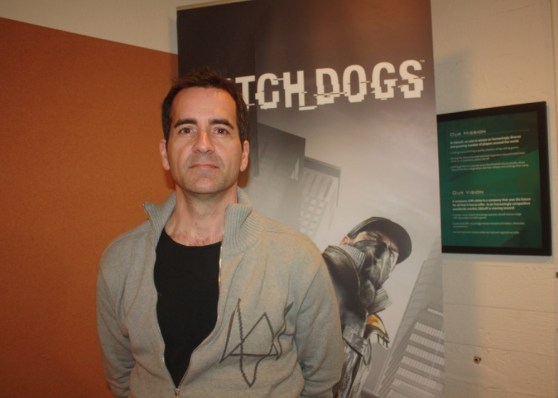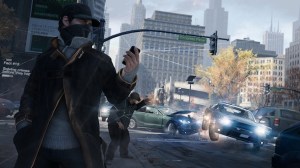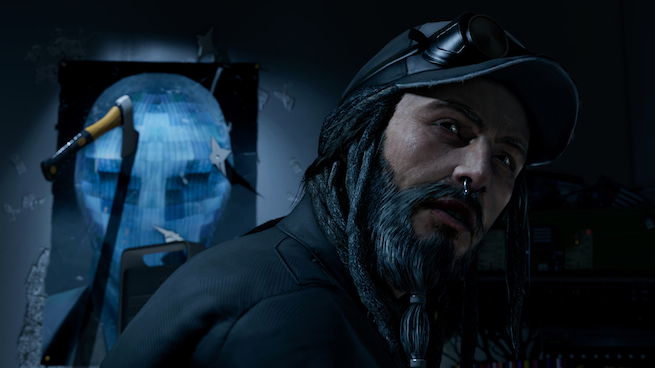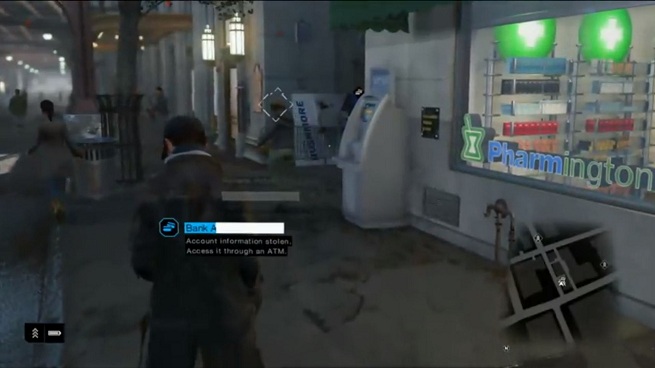This interview contains some plot spoilers for Watch Dogs.
The story behind Watch Dogs has been vague so far. In demos, Ubisoft has shown how hacker Aiden Pearce can control a smart city by hacking into it with his smartphone. But who is Aiden Pearce? Why is he so mad? Who is he after? And who is after him? And just who is the good guy in this vigilante story?
Kevin Shortt, the lead writer for Watch Dogs at the French game publisher, can finally talk about some of these details. While Ubisoft has shown off the cool technology in the game and the beauty of its open world, it hasn’t revealed too much of the story until now. We still don’t know a lot about the plot twists, but now we have a much better feel for what drives its main character.
I interviewed Shortt after a couple of hours playing the game at a preview event in San Francisco. He’s been locked up for five-and-a-half years, working on the story and the little details that make the world of Watch Dogs believable.
GamesBeat: In past presentations, you guys haven’t made many disclosures about the story. Now you’re describing it more. What would you say about how this story matches up with what’s going on in the game?
Kevin Shortt: It starts with what we’ve always talked about. Here’s this modern-day vigilante who’s tormented by guilt over the death of his niece. He’s trying to find the people responsible for that. At the same time, he’s a bit overprotective, obsessively so, about his sister and nephew.
In amid of all this, while he’s trying to find these people, an old mentor comes back into the picture, a guy named Damian Brinks. You see him at the very beginning of the game. He insists that they work together again. Aiden rejects him, will not work with him. So they immediately have a head to head, and that becomes something Pearce is going to have to deal with. He hacks into ctOS, tries to take more control of ctOS, so he can turn the city against Damian and try to stop him. But as he does that, he starts to realize there’s something more going on inside ctOS. There are secrets and lies interwoven in all of this. His personal story, while wrapped up in the whole story, starts opening up into something bigger and more sinister.
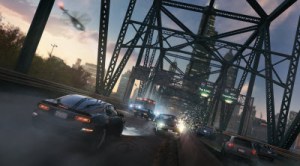 GamesBeat: Does Aiden face multiple threats, then? Or is he sort of uncovering a single enemy behind all of this?
GamesBeat: Does Aiden face multiple threats, then? Or is he sort of uncovering a single enemy behind all of this?
Shortt: Aiden definitely instigates a lot of what happens. The more he digs, the more he ends up on people’s radar. He gets a lot of people against him. Damian is one of the people who’s always trying to force Aiden’s hand, but absolutely, the more he digs, the more he gets himself into tricky situations.
GamesBeat: In the pure demos before, it seemed like Aiden was all-powerful. But he’s actually up against people who are more powerful?
Shortt: Damian is probably the superior hacker, in a way. He was Aiden’s mentor. That’s how Aiden learned to hack, from him. So he’s going to be formidable. A lot of people you’ll meet are going to challenge Pearce. Some are better hackers who are going to help him, but some are also adversaries he’ll have to deal with.
GamesBeat: Is the campaign linear and long, or does it have other t–
Shortt: Does it branch off? We talked about that. Do we want to have a story that branches based on player action? We decided, no, we don’t want to do that. I’m not a fan of the idea. When you do those types of stories, you have to loosen the story up to accommodate different choices. When you do that, you end up with a weaker story.
Then you get to the end of the game, and you have maybe three or four choices of endings. What ends up happening is that then I go online and see what the other endings were. Okay, cool, those were the other endings that could have happened. You and I talk about the game, and where does the discussion start? What ending did you get? Oh, how did you get to that ending? That’s not the discussion we want players to have.
We want players to have a singular journey, the same experience, so that they can have a discussion—It’s like when you go to the movies. You and I go to the movies and see the same movie, but we come out with different opinions, and we can have a discussion about that. Oh, you thought this guy was behind all of it? No, I didn’t think so. Here’s the conspiracy we think is going on. You get to have that discussion because we all end up at the same place and come away with the same events we can interpret how we want to.
Where the player expression comes in is in the way they use the tools they have, the weapons they have, how they hack. It’s also in the way you interpret the things that you see, like the profiler. Every person has a profile that you can scan and see. That’s all systemically generated.
GamesBeat: You have your army of writers creating those little profiles.
Shortt: Exactly. We had a lot of writers who were very busy. The thing about that is, they aren’t unique profiles. Because the city is so big, and we wanted to make sure those profiles are just perpetual – they go on and on – we needed to make sure every profile would be unique. To do that, we had to run off a system. I don’t even know myself how a profile is going to show up in the game. What’s great about that is that it constantly surprises even me.
GamesBeat: It’s all procedural, then, mixing together different elements?
Shortt: Right. The way they look, certain facts about them. When you hack them, you hear phone calls. Again, we don’t know how those will come up, exactly. What’s cool about that is, you are then deciding who that NPC is on your own. You’re bringing a third element. We give you how they look and a couple of facts. You bring the third element – here’s their life. I’ve decided who they are, interpreted who they are.
GamesBeat: Do some of these random people lead you into parts of the campaign? One thing I noticed was that when I would finish a mission in the campaign, I wouldn’t immediately just go out to the map and see the next campaign point. It seems like I might have to wait a while or look for where to go next.
Shortt: There shouldn’t be too much of that. That may just be a matter of tuning. There’s not much delay between finishing one mission and the next point coming up, inviting you to go there.
GamesBeat: So it is directed in that way?
Shortt: Yes. We wanted to make sure that the player always knows where the main story is going next. It’s up to them when they want to go there, but we want to make sure that they never feel as if they don’t know where to go. They may want to try out some of their hacking skills somewhere else. They might want to do mini-games. They might want to play chess or do some of the digital trips. They can try out many things on their own. We want to encourage that, letting players explore the world.
What happens in the open world is as significant in terms of the themes we’re talking about – privacy, secrecy, what you do with information. That’s as important in the open world as it is in the main path. How you interpret NPCs, what you do with the information that you get to that—You asked if that could lead to other things. If you’re out in the open world in free-roam and you hack an NPC, none of those will directly point you back to that mission, because we’re not ever trying to say, “Okay, now it’s time to go back to the mission.”
Sometimes it will just be a phone call that’s kind of curious or interesting. Other times it could be a text message where you realize someone might get killed or robbed. It becomes an opportunity to step in as a vigilante and try to stop that from happening. In several instances, it’ll lead to gameplay for the player.
GamesBeat: Does the story make you walk this line as far as whether you want to be a good guy or a bad guy as a vigilante?
Shortt: I don’t think we’re asking the player to decide whether they’re going to be “good” or “bad.” We like writing in that gray zone. The situations we put players in are meant to make them think a little more. That’s why the profiler is so important for us. It turns NPCs into people. You have to make choices about those people.
Cumulatively, it’ll hopefully get the player to come away thinking, “Wow, I have all this power to hack into people’s lives.” That’s exciting. It’s great to be able to peer into someone’s life and see what goes on behind the curtain. It’s human nature. But it also raises the question of what right we have to that information.
We’re trying to challenge players in that regard in a soft way, whenever we can. I see it working in the ways players decide to play. You see them hacking for bank accounts or songs or system keys, which you can use to craft things. But you see players decide, “OK, I won’t do it to that person, because they’re unemployed.” They’re making choices based on what they read in the profile.
Did you try anything where you can hack into a camera and see inside a building, inside someone’s home?
GamesBeat: No, I didn’t get there.
Shortt: They’re all around the city. If you check the map, it’ll show you. See, you can hack into that phone there, which incorporates a little camera. We’re looking at the ceiling, but we can hear the conversation nearby. We have a variety of those sorts of things happening throughout the game.
We wanted to make sure we had a range of topics. Some of them, you see someone trying to kill another person. Or you see someone who’s just been killed. You can look at that and say, “Well, it’s good that the camera saw this.” There’s a sense that you’re seeing something that you’re clearly bad. But we have other moments that are more private and human, like a couple having a talk about how someone they know is dying. The wife says to the husband, “You have to let yourself die. We can’t afford your medical bills anymore.”
That’s a heartbreaking moment. It’s important to have that in there, because it raises the question – “Should I be seeing this? This is a private moment. It’s their problem. I don’t get anything out of this.” Apart from the fascination of seeing into someone’s life. By putting you in the hands of Aiden Pearce and giving you all this power, it’s a way to get the player thinking, “Wow. We’re moving to a world where privacy isn’t really a thing anymore. Everything is online. Everything is hackable. We’re moving fast. Maybe it’s worth slowing down and seeing what we think about this.”
GamesBeat: How do you look back on this story? Is there a moment where it becomes a morality tale in the way that The Last of Us was? They wanted to direct you to this one point in time where the character makes a decision, and it affects the fate of the world. It tells you something about the character. It’s a very powerful ending, and it’s very directed.
Shortt: Pearce goes through an evolution, absolutely. He starts very single-minded, very much out for himself. Even this idea of protecting his family and obsessing over his family’s safety, it really comes from a selfish place. He made a mistake in the past and he’s determined to fix that. He just cloaks it in this idea of, “I want to protect my family.”
So he goes through an evolution from there over the course of the game. His eyes are opened to the amount of power and access he has. He realizes that his personal goals should be overshadowed by something bigger. He realizes that something more is going on. I hope that players—We don’t want players to come away thinking, “Okay, that’s the answer to it all.” What I would love is if players finish the game–They see Pearce’s evolution from this pretty selfish guy to a guy who’s opened up a bit more. I hope they come away looking at their own lives and privacy and security and access to information and they now have something to bring to the table when we talk about those issues, things like the NSA or Edward Snowden. It’s all part of our discussions nowadays. It would be great if we could be part of that dialogue.
GamesBeat: It seems like the direction of the news in the last year or so — it makes you much more topical. You’re bringing up issues that people care about more now.
Shortt: That all came up almost a year ago, yeah. It was funny. When we started this project, back in 2009—you start digging into this idea of hacking and privacy and information. You start getting wrapped up in that world. You start extrapolating. Where could this guy? If this goes here, it means this. Who’s controlling this information? A corporation? Governments want that information.
You saw the video we had back in 2012, do you remember? We released an announcement video that was all about CTOS and how everyone is a data cluster. Way back then, that’s what we were talking about. When the news came out, I think we had a mixture of, “Oh my God, it’s really happening at the level that we’d envisioned,” and then at the same time, “Well, of course it is.”
GamesBeat: When I talked to the fellow from the security firm Kaspersky, he mentioned that they’d uncovered this sizable plot to infiltrate security cameras and the like. That’s another element of the plot, along with the NSA revelations, that’s coming true.
Shortt: They’ve been toying with the idea of smart cities for years. That’s where we got the idea for CTOS. But no one’s ever done it on a major city like Chicago, yet. “Yet” is the key word. I think we’ll gradually move toward that.
We want to be a contemporary game. We want people to look at Chicago and say, “That’s a real city, today’s city.” But it’s wrapped in this CTOS. You hopefully put down the controller, you grab your phone, and you think, “Huh. All the information I was hacking in there, that’s the information I have in my phone here. That’s the information that could be hackable for me.”
GamesBeat: You guys did take some extra time here. Was the story any part of that?
Shortt: No, no. Everything’s done by that point in terms of story. One thing we did do, though. We took the opportunity, while we were polishing, to work on the profiler. We thought, “Okay, we can only benefit from adding more information to that profiler, making it more robust and unpredictable.” That was something we could do. We also went back to Chicago and recorded more random voices within the city. We’re just filling out that living city, so that you’re hearing more random conversations. We want the world to become more alive, as much as possible.
VentureBeat's mission is to be a digital town square for technical decision-makers to gain knowledge about transformative enterprise technology and transact. Learn More

